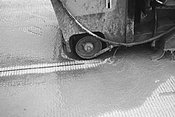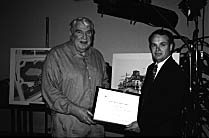U.S. Department of Transportation
Federal Highway Administration
1200 New Jersey Avenue, SE
Washington, DC 20590
202-366-4000
Focus
| Accelerating Infrastructure Innovations |
Publication Number: FHWA-RD-00-061
Date: September 2000
On the football field, John Madden coached his team to Super Bowl success. In the new video, Smoother Roads Playbook, he introduces viewers to the Kansas Department of Transportation's (DOT) successful strategy for achieving smoother concrete pavements. Since implementing new smoothness specifications for concrete pavements 15 years ago, Kansas has gained national recognition for its innovative techniques and construction practices. The introduction of the pavement smoothness specification "was the single most important impact on concrete paving that I've seen in my career," says Mike Lackey, former State Transportation Engineer for Kansas DOT.
As explained by the video, which was jointly produced by Kansas DOT and the Federal Highway Administration (FHWA), smoothness has been promoted in Kansas not only by the new specifications but through an incentives program that compensates contractors for their extra efforts. This program and the smoothness specification in general have been well received by contractors. "The very fact that Kansas DOT has the smoothness incentive specification has raised the standard of paving in the State of Kansas, without a doubt," says Don Beuerlein, president of Koss Construction.
 |
 |
|
 |
| Kansas DOT's best practices for achieving smoother concrete pavements include maintaining a consistent paving speed and avoiding stopping or slowing the paver. |
How have the DOT and contractors achieved these smoother pavements? The best practices advocated by Kansas and addressed in the video include making sure that the stringline, which is the primary guidance system for most paving equipment, is set precisely and protected from damage during paving. It should also be checked for proper grade and elevation before each paving operation. As the video noted, "the stringline has the greatest potential to affect smoothness." Another best practice is to maintain a consistent paving speed and avoid stopping or slowing the paver. To do this, contractors have to make sure they have an adequate supply of concrete delivered to paving sites and that delivery vehicles can move quickly and easily through a site and then back to the concrete plant. Contractors also strive for mix consistency and constantly monitor the concrete buildup in front of the paver to make sure that it doesn't get too high or low, as this can cause the concrete to swell or, conversely, a low spot to appear, resulting in a rougher pavement.
Implementing a smoothness spec also depends upon accurate monitoring of pavement conditions once the road is in place. Kansas uses a California-type profilograph and zero blanking band to measure pavement smoothness and sets stringent calibration and certification requirements for the equipment. Contractor-owned profilographs have to be recertified for accuracy once a year, and contractors are required to set up a test track at each project site to check the performance of their equipment onsite. Profilograph operators must also attend a certification class once every 3 years.
None of these best practices can be carried out without a motivated work- force, however. "The key to achieving pavement smoothness starts with the personnel," says Beuerlein. At Wittwer Paving, that belief is put into practice by giving 25 percent of the incentive money received on projects back to employees.
 |
| John Madden is awarded a certificate of appreciation for his work on the new concrete smoothness video, Smoother Roads Playbook. Presenting the award is Gary Hamby, FHWA's Western Resource Center manager. |
Are ultra-smooth pavements costing Kansas more? The State says no. "I think we get our money's worth," says Lackey. "Our pavements last longer and there's less maintenance." David Wittwer, President of Wittwer Paving, echoes that thought. "We don't think our quality costs a lot of money. In fact, I've told our people, quality doesn't cost-it pays."
That quality will pay off for States and contractors, not only in increased efficiency, but in more satisfied customers. As Madden says in the conclusion of the video, "the more the highway industry uses these techniques, the more all of us who ride on the roads will appreciate what you do."
To obtain a copy of the video, contact Mark Swanlund at FHWA, 202-366-1323 (fax: 202-493-2070; email: mark.swanlund@fhwa.dot.gov).